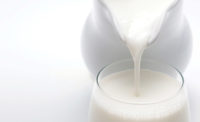
Dairy Subsidies Biggest Issue in 2007
by Stephen Barlas
One issue stands out as the behemoth for dairy food marketers as the new Congress gets underway: the 2007 farm bill and prospective changes to the three major federal milk programs.
Cheese, ice cream and yogurt companies all agree that
milk marketing orders, milk price supports and the Milk Income Loss
Contract (MILC) program need to either be eliminated or radically clipped
back so that milk prices sit at free market levels.
“Unfortunately, we cannot fix all the problems
with the federal dairy policies overnight, but we can initiate a transition
from a multiple, divisive and costly subsidies to a single, national dairy
farmer safety net,” says James Green, president and chief executive
officer of Minneapolis-based Kemps LLC, a unit of HP Hood, Chelsea, Mass.
Kemps manufactures and markets a wide variety of dairy products, including
fluid milk, cottage cheese, yogurt, sour cream and dips.
Chip Kunde, senior vice president at the International
Dairy Foods Association (IDFA), agrees that the federal milk subsidy
programs are head and shoulders above all other issues, and not only
because of the way they distort the market for milk. They are also
objectionable, Kunde says, because those subsidies are also used as an
excuse for export markets to throw up barriers to imports of U.S. cheese
and other dairy products on the basis of U.S. “market
distorting” subsidies.
However, it is highly unlikely that the agriculture
committees in the House and Senate will make major changes to milk
subsidies. That is because the Democrats now chairing those committees
are from much stronger milk-producing states than the Republicans
they replace.
Minnesota is home to new House Ag Committee Chairman
Collin Peterson, who replaces Rep. Bob Goodlatte. Goodlatte is from
Virginia, which, according to the USDA, produced 152 million pounds of milk
in 2005, making it the No. 20 producer state. Minnesota, on the other hand,
is No. 6 at 694 million pounds.
Similarly, Sen. Tom Harkin, the new Senate Ag
Committee chairman, is from Iowa, which is a much bigger milk-producing
state than Georgia, home to the former chairman, Sen. Saxby Chambliss.
In addition, Rep. David Obey (D-Wis.) will chair the
House Appropriations Committee and Sen. Herbert Kohl (D-Wis.) is in line to
chair the Senate Appropriations Committee subcommittee on agriculture.
Granted, Wisconsin is a big cheese state, too. But it is hard to see Obey
and Kohl allowing major changes to the price support system or the MILC
subsidy.
However, a top House Agriculture Committee staffer
explains that the key political fact influencing the shape of the 2007 Farm
Bill is that there will be less federal money available for support
programs — milk and otherwise — than there was in 2002, the
last time a Farm Bill was written, when the federal government was flush
with a budget surplus. “That is not the case any more,” the
staffer emphasizes. “There will be fewer dollars to work
with.”
That is why the IDFA’s Kunde thinks there will
be a fight over the milk subsidy programs, but on the House and Senate
floors, where the power of the Ag and Appropriations Committee chairmen
will be somewhat diluted. Kunde concedes: “It is by no means a slam
dunk.”
Stephen Barlas has been a full-time freelance
Washington editor for business and trade magazines since 1981.
$OMN_arttitle="Dairy Subsidies Biggest Issue in 2007";?>
$OMN_artauthor="Stephen Barlas";?>